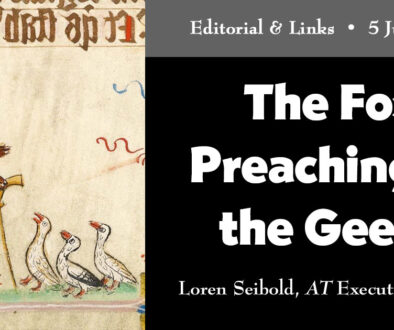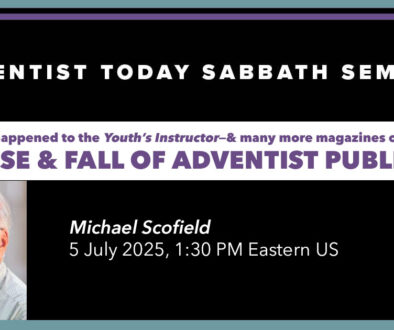ATSS: Dr. Katrina Blue on Spirituality and Seventh-day Adventists
17 February 2022 |
What is Biblical spirituality? Seventh-day Adventists speak of spiritual experience, of feeling God’s presence, but in practice much of our spirituality seems rooted in doctrines and interpretation. Ellen White encourages us to experience God, but also says we shouldn’t trust feelings and experiences. Our top church leaders warn against meditation and mysticism. And many of us find it easier to root our faith in cognitive explanations about God.
Dr. Katrina Blue will lead us in a discussion of what spirituality means for Seventh-day Adventists.
To read for the class:
Excerpts from the “Andrews Theological Seminary Statement on Biblical Spirituality”
We believe that the greatest and most urgent of all our needs is a revival of true godliness, which is true biblical spirituality, or having Christ formed in us by the Holy Spirit (Gal 4:19; Col 1:27). Such spirituality is not natural to the sinful person who regards it as foolishness: “The natural man does not receive the things of the Spirit of God” (1 Cor 2:14). A vital part of discipleship and the training of gospel workers at the Seventh-day Adventist Theological Seminary is to enable them to cultivate genuine biblical spirituality through justification and the process of sanctification, for it is impossible for them to give others what they themselves do not have (Acts 4:13; 1 Cor 6:11; 1 Pet 1:2).
As in all matters of faith, Christians of the twenty-first century need to safeguard their beliefs and practices about spirituality to ensure that they do not depart from biblical principles. In today’s postmodern, pluralistic world, with its multiple influences from Eastern non-Christian religions, animism, New Age and other sources, the meanings of concepts related to “spirituality” and “spiritual formation” have become ambiguous and conflicted. Some terms once used freely by Adventists have become controversial. For example, the term “spiritual” is now used by some in today’s culture as a generic, all-inclusive word for sensory emotional, physical, intellectual, or relational experiences intended to build a positive relationship with a nebulous “higher power” either inside or outside of the self. Sometimes spirituality is associated with non-biblical practices such as “centering prayer,” or “prayer labyrinth.” Part of the challenge is that some words used to convey biblically faithful meanings can also be used to convey biblically unacceptable meanings.
Principles of Biblical Spirituality
Biblical spirituality can be defined as the process of the divine restoration and healing of the broken relation between the Triune God and humanity. As such, biblical spirituality is the response of a repentant human heart and mind to the loving heart and mind of God (1 Cor 2:12-13; Rom 8:14). God created us in His image with the capacity to communicate with Him in a personal relationship.
…
In sum, a divinely effected spiritual life stands in direct opposition to living according to the flesh (John 3:6; Rom 8:5-14; 1 Cor 2:12-14; Gal 5:16-6:1). Biblical spirituality means to be born of God (John 1:12-13; John 3:5-8; 1 John 4:7), be changed by the grace of Jesus Christ (Rom 12:1-2), surrendered and obedient to the Spirit, living according to the Spirit (Rom 8:4-11), and consequently empowered by the Spirit to draw others to find life in the Spirit. This is the process of sanctification concerning which Ellen White writes: “The sanctification of the soul by the working of the Holy Spirit is the implanting of Christ’s nature in humanity” (Christ Object Lessons, p. 384). Thus, biblical spirituality both reflects and engenders a worldview about the holy, gracious and attractive Triune God in relation to the human self in which the true restoration and healing of the broken relationship between God and humanity is vitally experienced in the context of the great controversy between Christ and Satan, good and evil.
Teacher:
Katrina Blue, Ph.D., is associate professor of Theology and Christian Spirituality at Pacific Union College.
Moderator:
Loren Seibold is the Executive Editor of Adventist Today.
How to join:
Listen to the presentation here.
When:
ATSS starting time depends on where you are. If you’re on the west coast of the United States, it’ll be 10:30 AM. On the east coast, 1:30 PM.
Times around the world:
-
- Reykjavík: 5:30 PM
- College Place: 10:30 AM
- Lincoln: 12:30 PM
- Denver: 11:30 AM
- Bracknell: 6:30 PM
- Loma Linda: 10:30 AM
- Nairobi: 8:30 PM
- Gackle: 12:30 PM
- Hosur: 11:00 PM
- Waco: 12:30 PM
- Tulsa: 12:30 PM
- Helsinki: 8:30 PM
- Stockholm: 7:30 PM
- Hamburg: 7:30 PM
- Cape Town: 7:30 PM
- Madrid: 7:30 PM
- Paris: 7:30 PM
- Honolulu: 7:30 AM
- Cooranbong: 5:30 AM (Sunday)
- Perth: 2:30 AM (Sunday)
The class is intended to last about 2 hours, though the conversation often continues to 4 PM on the east coast of the United States.
About our class:
- The AT Sabbath Seminar is intended to be a courteous forum. We discuss and ask questions politely. We don’t accuse, get angry, or put people down.
- Stick to the topic in both comments and chat discussion.
- Make your comments and questions short—don’t dominate.
- Keep your microphones muted unless you are called upon to make your comment or ask your question.
- Indicate your interest in speaking by raising your electronic hand—under the “reactions” button.
- Please use your name when you sign in! Not your phone number, not your initials. This will help us differentiate you from unwelcome guests who want to disrupt us. You can set your name after signing on by clicking on the 3 dots next to your picture, which drops down a menu.
- If it should happen that we are attacked so that we have to stop the meeting, we’ll quickly post a new meeting link on our AT Facebook page.
We look forward to getting acquainted with you!
Coming up:
- Michael Campbell
- Gerald Winslow




